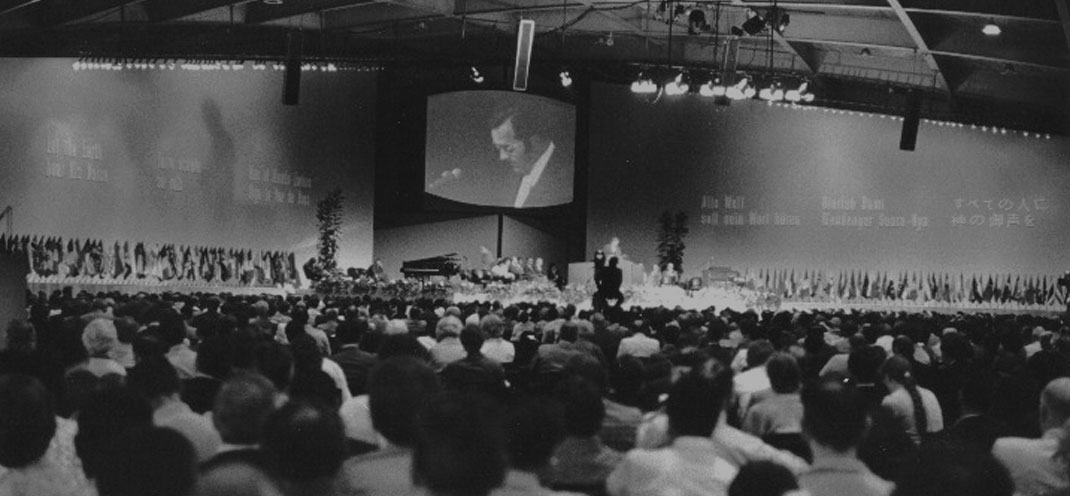Today Lausanne continues to fulfill its unique calling to connect leaders across regions, issues, and generations to collaboratively and prayerfully work toward the advancement of the gospel.
Learn More about Lausanne’s Unique Calling
The beginnings of the Lausanne Movement
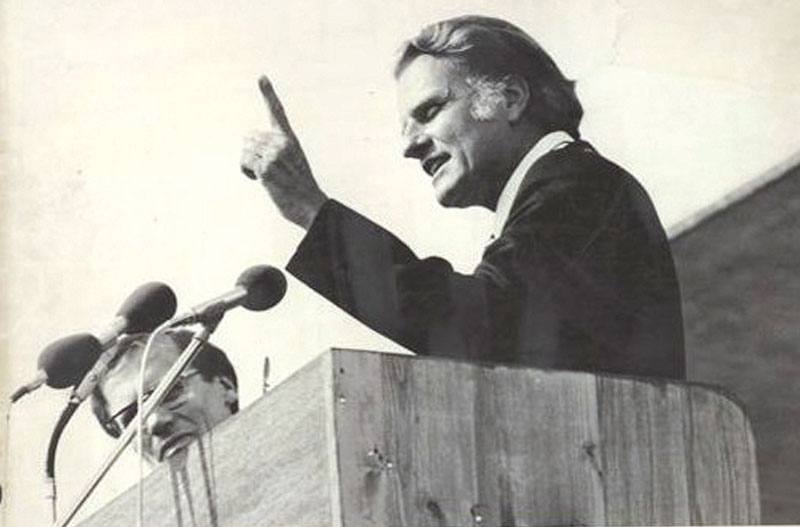
Our story begins with the evangelist Dr Billy Graham. As he started preaching internationally, he developed a passion to ‘unite all evangelicals in the common task of the total evangelization of the world’.
In the 1970s, Billy Graham perceived the need for a global congress to reframe Christian mission in a world of political, economic, intellectual, and religious upheaval. The church, he believed, had to grasp the ideas and values behind rapid changes in society.
In July 1974, over 2,400 participants from 150 nations gathered in Lausanne, Switzerland, for the First International Congress on World Evangelization. TIME magazine described it as ‘a formidable forum, possibly the widest-ranging meeting of Christians ever held’.
Listen to Billy Graham’s Opening Address
Those who attended remember with gratitude God’s presence and favor on those ten days of prayer and planning for global mission, which galvanized the church in three major ways:
 1. Theological foundation for global mission
1. Theological foundation for global mission
The Lausanne Covenant, drafted by an international committee chaired by John Stott, has come to be regarded as one of the most significant documents in modern church history. It defined the necessity and goals of evangelism, bringing together evangelicals from diverse backgrounds and shaping much of their endeavours for the rest of the century.
Read The Lausanne Covenant and John Stott’s Commentary
 2. Unreached people groups
2. Unreached people groups
Hailed as ‘one of the milestone events in missiology’, Ralph Winter’s plenary address in 1974 introduced the now ubiquitous term ‘unreached people groups’. Winter contended that cross-cultural mission needed to be the primary task of the church, as thousands of ethnic groups remained without a single Christian and with no access to Scripture in their language.
Watch the State of the World Address from YLG2016
 3. Holistic mission
3. Holistic mission
The Congress urged the necessity of both evangelism and social justice in mission, with the voices of Latin American theologians Samuel Escobar and Rene Padilla among the clearest to be heard. This created a paradigm shift for much of the evangelical thinking of the time, and today the widespread embrace of holistic, or integral, mission can largely be attributed to the 1974 Congress.
Learn more about the Integral Mission Issue Network
Manila 1989: New Global Partnerships

In 1989, the Second International Congress on World Evangelization was held in Manila, Philippines. There was notable involvement from the Soviet Union, Eastern Europe, women, and laity. Manila 1989 served as a launch pad for further key strategies and milestones in global mission:
 10/40 Window
10/40 Window
Luis Bush built on Ralph Winter’s 1974 presentation of unreached people groups (UPGs) by identifying the geographical region where the majority of UPGs are located. The concept of the 10/40 Window has helped numerous mission agencies and churches to focus their ministries between the 10 to 40 degree latitudinal areas of North Africa, the Middle East, and Asia.
 Global partnerships
Global partnerships
Over 300 mission partnerships, networks, and new ministries came out of Manila 1989 to address a wide range of critical missional issues. Many of these new partnerships were among groups working in the majority world.
Cape Town 2010: A Platform for the Global Church
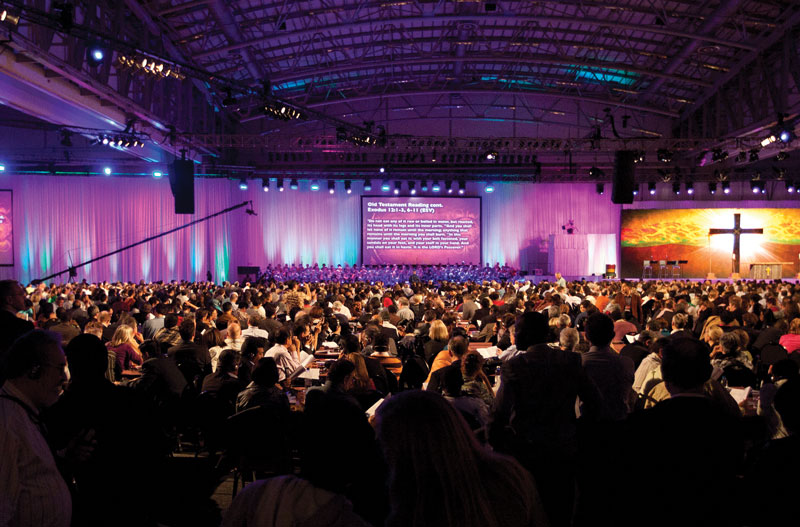
Christianity Today described the Third Lausanne Congress on World Evangelization in Cape Town as ‘a younger, more ethnically diverse, and more geographically varied consortium of evangelical leaders than ever before’. Cape Town 2010 was carefully assembled to depict an accurate demographic of the global church, giving particular voice to the church in the majority world.
Issue networks: Following the CTC road map
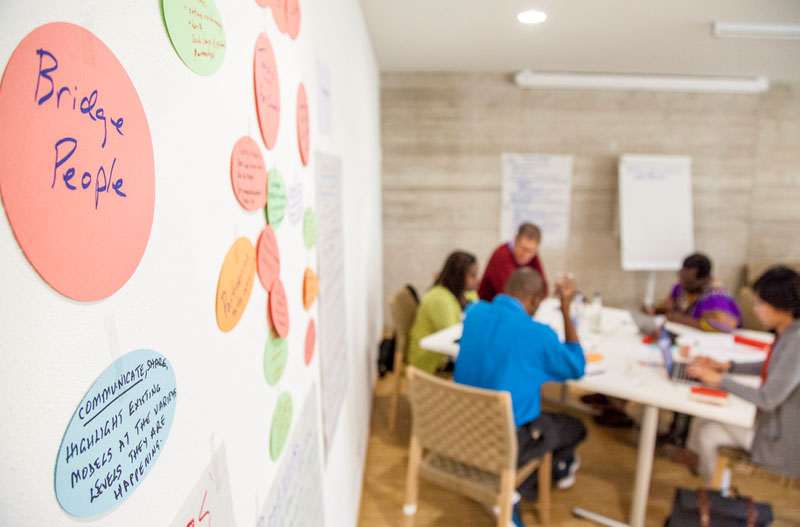
Over 30 pressing missional challenges, most with a corresponding issue network, were identified in The Cape Town Commitment (CTC). These included the advance of the gospel among oral learners, in diaspora communities, in the world of ideas, and in every sphere of society including the marketplace, the academy, and the public square. The CTC captures what we believe the Holy Spirit is saying to the church in our times and serves as a road map for the activities of the Movement.
Today influencers continue to gather through these issue networks and in other global consultations focused on critical missions topics. The networks and consultations often publish resources for leaders around the world, which continue to help shape mission theology and practice.
Learn about the hundreds of videos, articles, and other missional resources freely available through our content library.
Explore Lausanne Issue Networks Browse Lausanne Content Library
Engaging Generations of Younger Leaders
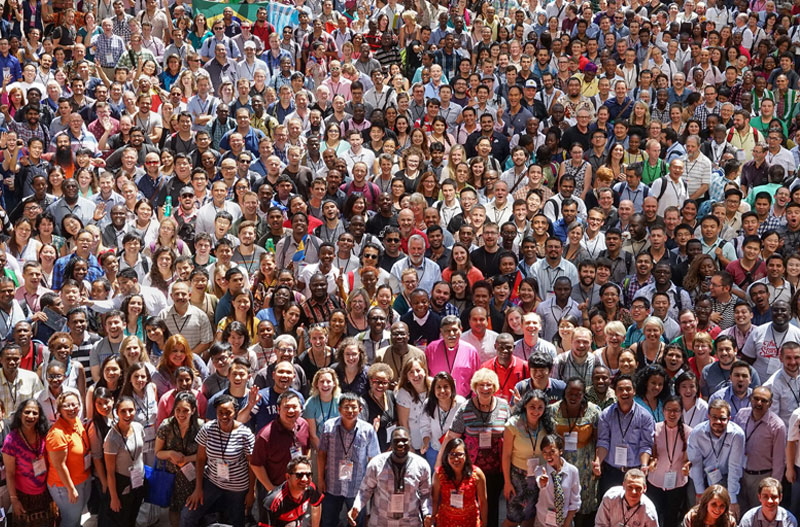
For every generation since 1987, Lausanne has held a Younger Leaders Gathering (YLG) to identify and bring together emerging influencers from around the world. The gatherings connect younger leaders with each other and with other senior global leaders to build up the next generation of influencers and encourage leadership development.
The first two YLGs were held in Singapore in 1987 and Malaysia in 2006.
The third YLG in 2016 (YLG2016) was held in Jakarta, Indonesia, convening more than 1,000 younger leaders and mentors from over 140 countries. In conjunction with YLG2016, a new initiative called the Younger Leaders Generation (YLGen) was launched as a commitment to intentionally mentor emerging influencers over the span of ten years.
Connecting Today’s Influencers for Global Mission
While much has changed in the more than 40 years since the first Lausanne Congress, our focus on connecting influencers and ideas for global mission continues to be our unique role in God’s global mission. Learn more about the Movement’s current calling and vision, as well as how to get connected.
